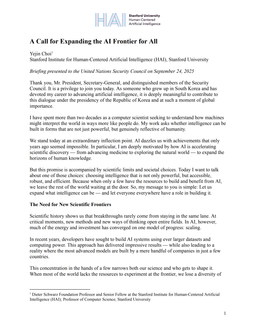International Affairs, International Security, International Development
How AI’s use in national security will influence global power dynamics.
AI Sovereignty’s Definitional Dilemma

Governments worldwide are racing to control their AI futures, but unclear definitions hinder real policy progress.

Governments worldwide are racing to control their AI futures, but unclear definitions hinder real policy progress.
How Can AI Support Language Digitization and Digital Inclusion?

This white paper analyzes the varying ways AI tools can advance language digitization work, and provides recommendations for responsibly realizing the potential of AI in supporting the digital inclusion of digitally disadvantaged languages.

This white paper analyzes the varying ways AI tools can advance language digitization work, and provides recommendations for responsibly realizing the potential of AI in supporting the digital inclusion of digitally disadvantaged languages.

The era of AI evangelism is giving way to evaluation. Stanford faculty see a coming year defined by rigor, transparency, and a long-overdue focus on actual utility over speculative promise.

The era of AI evangelism is giving way to evaluation. Stanford faculty see a coming year defined by rigor, transparency, and a long-overdue focus on actual utility over speculative promise.
Beyond DeepSeek: China's Diverse Open-Weight AI Ecosystem and Its Policy Implications

Almost one year after the “DeepSeek moment,” this brief analyzes China’s diverse open-model ecosystem and examines the policy implications of their widespread global diffusion.

Almost one year after the “DeepSeek moment,” this brief analyzes China’s diverse open-model ecosystem and examines the policy implications of their widespread global diffusion.
Fei-Fei Li, ‘Godmother Of AI,’ Points To Risks Of Cuts To US Research Funds, Student Visas
Fei-Fei Li, co-director of Stanford HAI, emphasized the risks of cutting research funding and international student visas to the US as it faces an increasingly competitive global tech race.
Fei-Fei Li, co-director of Stanford HAI, emphasized the risks of cutting research funding and international student visas to the US as it faces an increasingly competitive global tech race.
Moving Beyond the Term "Global South" in AI Ethics and Policy

This brief examines the limitations of the term "Global South" in AI ethics and policy, and highlights the importance of grounding such work in specific regions and power structures.

This brief examines the limitations of the term "Global South" in AI ethics and policy, and highlights the importance of grounding such work in specific regions and power structures.
All Work Published on International Affairs, International Security, International Development
How Stanford HAI Defines Human-Centered AI With Executive Director Russell Wald
In this podcast, HAI Executive Director Russell Wald explores how universities, policymakers, and industry must collaborate to keep AI human-centered. Wald shares takeaways from the AI Index, explains how China is narrowing the performance gap, and outlines why academic institutions are vital to ethical AI leadership.
In this podcast, HAI Executive Director Russell Wald explores how universities, policymakers, and industry must collaborate to keep AI human-centered. Wald shares takeaways from the AI Index, explains how China is narrowing the performance gap, and outlines why academic institutions are vital to ethical AI leadership.

In this address, presented to the United Nations Security Council meeting on "Maintenance of International Peace and Security," Yejin Choi calls on the global scientific and policy communities to expand the AI frontier for all by pursuing intelligence that is not only powerful, but also accessible, robust, and efficient. She stresses the need to rethink our dependence on massive-scale data and computing resources from the outset, and design methods that do more with less — by building AI that is smaller and serves all communities.
In this address, presented to the United Nations Security Council meeting on "Maintenance of International Peace and Security," Yejin Choi calls on the global scientific and policy communities to expand the AI frontier for all by pursuing intelligence that is not only powerful, but also accessible, robust, and efficient. She stresses the need to rethink our dependence on massive-scale data and computing resources from the outset, and design methods that do more with less — by building AI that is smaller and serves all communities.

HAI's white paper shows "Most major LLMs underperform for non-English—and especially low-resource—languages; are not attuned to relevant cultural contexts; and are not accessible in parts of the Global South."
HAI's white paper shows "Most major LLMs underperform for non-English—and especially low-resource—languages; are not attuned to relevant cultural contexts; and are not accessible in parts of the Global South."

This brief presents an analysis of Chinese AI startup DeepSeek’s talent base and calls for U.S. policymakers to reinvest in competing to attract and retain global AI talent.
This brief presents an analysis of Chinese AI startup DeepSeek’s talent base and calls for U.S. policymakers to reinvest in competing to attract and retain global AI talent.

The 2025 AI Index reports that the U.S. is still the global leader in state-of-the-art artificial intelligence, but China has closed the gap considerably.
The 2025 AI Index reports that the U.S. is still the global leader in state-of-the-art artificial intelligence, but China has closed the gap considerably.
Mind the (Language) Gap: Mapping the Challenges of LLM Development in Low-Resource Language Contexts

This white paper maps the LLM development landscape for low-resource languages, highlighting challenges, trade-offs, and strategies to increase investment; prioritize cross-disciplinary, community-driven development; and ensure fair data ownership.
Mind the (Language) Gap: Mapping the Challenges of LLM Development in Low-Resource Language Contexts
This white paper maps the LLM development landscape for low-resource languages, highlighting challenges, trade-offs, and strategies to increase investment; prioritize cross-disciplinary, community-driven development; and ensure fair data ownership.
